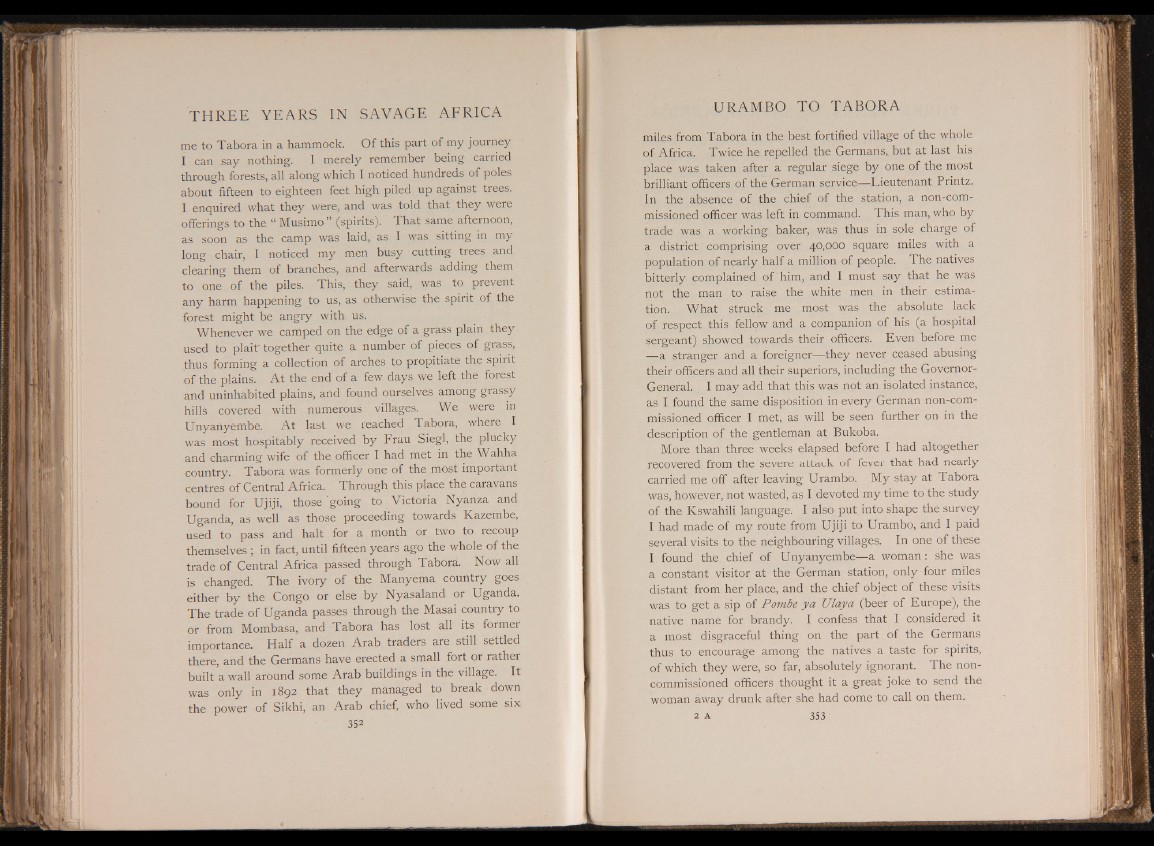
me to Tabora in a hammock. Of this part of my journey
I can .say nothing. I merely remember being carried
through forests, all along which I noticed hundreds of poles
about fifteen to eighteen feet high piled up against trees.
I enquired what they were, and was told that they were
offerings to the “ Musimo ” (spirits). That same afternoon,
as soon as the camp was laid, as I was sitting in my
long chair, I noticed my men busy cutting trees and
clearing them of branches, and afterwards adding them
to one of the piles. This, they said, was to prevent
any harm happening to us, as otherwise the spirit of the
forest might be angry with us.
Whenever we camped on the edge of a grass plain they
used to plait’ together quite a number of pieces of grass,
thus forming a collection of arches to propitiate the spirit
of the plains. At the end of a few days we left the forest
and uninhabited plains, and found ourselves among grassy
hills covered with numerous villages. We were in
Unyanyembe. At last we reached Tabora, where I
was most hospitably received by Frau Siegl, the plucky
and charming wife of the officer I had met in the Wahha
country. Tabora was formerly one of the most important
centres of Central Africa. Through this place the caravans
bound for Ujiji, those going to Victoria Nyanza and
Uganda, as well as those proceeding towards Kazembe,
used to pass and halt for a month or two to recoup
themselves ; in fact, until fifteen years ago the whole of the
trade of Central Africa passed through Tabora. Now all
is changed. The ivory of the Manyema country goes
either by the Congo or else by Nyasaland or Uganda.
The trade of Uganda passes through the Masai country to
or from Mombasa, and Tabora has lost all its former
importance. Half a dozen Arab traders are still settled
there, and the Germans have erected a small fort or rather
built a wall around some Arab buildings in the village. It
was only in 1892 that they managed to break down
the power of Sikhi, an Arab chief, who lived some six
352
miles from Tabora in the best fortified village of the whole
of Africa. Twice he repelled the Germans,, but at last his
place was taken after a regular siege by one of the most
brilliant officers of the German service—Lieutenant Printz.
In the absence of the chief of the station, a non-commissioned
officer was left in command. This man, who by
trade was a working baker, was thus in sole charge of
a district comprising over 40,000 square miles with a
population of nearly half a million of people. The natives
bitterly complained of him, and I must say that he was
not the man to raise the white men in their estimation.
What struck me most was the absolute lack
of respect this fellow and a companion of his (a hospital
sergeant) showed towards their officers. Even before me
—a stranger and a foreigner—they never ceased abusing
their officers and all their superiors, including the Governor-
General. I may add that this was not an isolated instance,
as I found the same disposition in every German non-commissioned
officer I met, as will be seen further on in the
description of the gentleman at Bukoba.
More than three weeks elapsed before I had altogether
recovered from the severe attack of fever that had nearly
carried me off after leaving Urambo. My stay at Tabora
was, however, not wasted, as I devoted my time to the study
of the Kswahili language. I also put, into shape the survey
I had made of my route from Ujiji to Urambo, and I paid
several visits to the neighbouring villages. In one of these
I found the chief of Unyanyembe—a woman: she was
a constant visitor at the German station, only four miles
distant from her place, and the chief object of these visits
was to get a sip of Pombe ya Ulaya (beer of Europe), the
native name for brandy. I confess that I considered it
a most disgraceful thing on the part of the Germans
thus to encourage among the natives a taste for spirits,
of which they were, so far, absolutely ignorant. The noncommissioned
officers thought it a great joke to send the
woman away drunk after she had come to call on them.